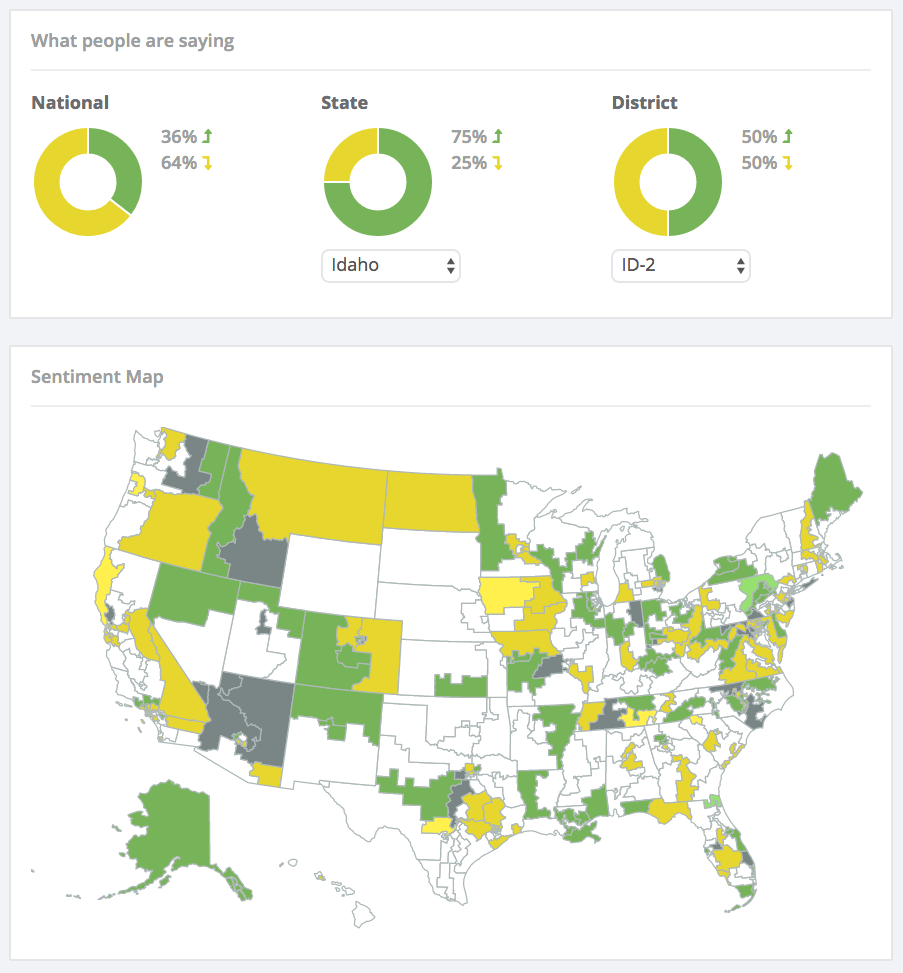POPVOX: Enhancing Transparency and Information-Exchange on Capitol Hill
Background
In 2010, at the beginning of the digital advocacy era, the United States Congress lacked the infrastructure to facilitate information exchange between public officials, constituents, and outside organizations. Working as a Congressional Staffer for the Chairman for the Ways and Means Health Subcommittee at the time, Marci Harris, CEO and Co-Founder of POPVOX, experienced firsthand the overwhelming amount of new information being directed at Congress. To enhance this process, streamline Congressional workflow, and increase transparency, Harris, along with co-founders Rachna Choudry and Joshua Tauberer, developed POPVOX.
Goals
From its inception, the primary goal of POPVOX has been connecting people on Capitol Hill with outside organizations and the general public to exchange information that might impact pending and future legislation. Furthermore, POPVOX makes congressional bills easier for constituents to locate, view, and track.
Process
Since its official launch in January 2011, POPVOX has offered an online platform for constituents to view, track, and discuss legislation, as well as connect with members of Congress. However, over the past year, there has been an increasing interest on the part of Congress and staffers to receive information from constituents and incorporate it within the legislative process.
Like this, some of the more recent and most important work being done at POPVOX is not viewable to the public, such as LegiDash, which was developed following the 2016 election, when Congress experienced a level of public input (e.g., via emails, phone calls, letters, etc.) it had never before seen. Specifically, LegiDash, a secure platform for Congressional and legislative staff, helps staff manage their workflow and receive information from the public, as well as track bills, view events, and add positions on behalf of Congresspeople.

The success of LegiDash has led to the development of other apps, including one for the Federation of American Scientists that helps scientists provide input on pending legislative matters in Congress. Similarly, the Environmental Justice Initiative – a project developed with the Natural Resources Committee for drafting environmental justice legislation on the POPVOX Madison platform – allows members of the environmental justice community, including indigenous and minority communities, to speak for themselves and provide feedback on environmental legislation.
Lessons and Challenges
Since POPVOX was first launched, three main challenges have been identified by Marci Harris and her team:
First, securing funding sources and creating business models that are consistent with the civic mission is a major challenge for developers of civic technology. Specifically, charging users to use or access a civic product creates a barrier to participation that directly counters the civic mission, as does an advertising model that sells or exploits user data. Overall, conventional business models that support commercial technologies do not always make sense for civic technology. Furthermore, funding models, such as venture capital, similarly do not align with the civic mission.
A second challenge for civic technology concerns the breadth and diversity of participation – an issue that also exists in the offline political engagement world. Generating online traffic through normal conditions, such as achieving virality through political scare tactics, diminishes individuals’ sense of political efficacy and confidence. Unfortunately, taking an offline problem and adding technology to it did not fix it: There are underlying issues that prevent people from understanding, engaging, and feeling empowered in the political sphere.
Finally, the standards of success for commercial technology do not make sense for civic technology. Specifically, commercial success measured via click-throughs, likes, views, and other metrics, are not the best ways to measure civic success. To address this, PopVox, together with Erhardt Graeff, has worked on determining whether engagement with civic technology increases political efficacy; that is, it helps users feel more informed, engaged, and valued in civic processes.
Next Steps
Next steps for Marci and her team at POPVOX include working on tools closely with Congress to enhance their functionality, including LegiDash, the Environmental Justice Initiative, and the project with the Federation of American Scientists, and building upon the work being done now based on renewed interest to improve Congressional technology. Specifically, this process is referred to as the S.I.D.E. model (for Stakeholders, Individuals, Data, Evidence and Experts), which brings together staffers, lawmakers, and committees to increase opportunities to incorporate them within the legislative process.
Additionally, POPVOX is launching an initiative with local governments and libraries in 2021, as well as developing a second version of an application released in 2018 for helping newly elected members of Congress (between election and orientation) access resources and connect with others called Elevator, with the goal of being relaunched after the next election cycle in early 2021.

Contact
Marci Harris, CEO and Co-Founder, POPVOX
marci@popvox.com

